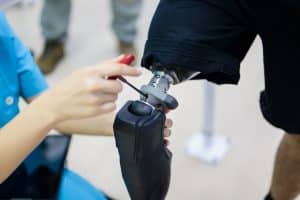Sleep is a peaceful escape for people; however, for thousands of veterans, it’s a nightly struggle. Insomnia, often triggered or worsened by military service, can impact every part of life: mental health, relationships, and the ability to work. Despite its serious effects, many veterans don’t realize that insomnia can be rated by the Department of Veterans Affairs (VA), especially when linked to conditions like PTSD or chronic pain.
In this blog, we will explore VA insomnia ratings, how to establish a service connection, the link between the sleep disorder and its secondary conditions, and the role nexus letters often play for those building a strong claim.
Table of Contents
How Military Service and Sleep Disorders are Interconnected
Veterans face unique challenges that make them particularly susceptible to sleep disorders. Deployment, trauma, irregular schedules, and harsh living environments typical in military life all contribute to long-term sleep disturbances among veterans. Studies by the U.S. Department of Veterans Affairs (VA) and the National Institutes of Health (NIH) reveal that:
- 57% of post-9/11 veterans report chronic insomnia.
- 93% of veterans with PTSD experience insomnia.
- 78% of veterans suffering traumatic brain injury (TBI) also report sleep dysfunction.
Veterans may experience:
- Acute insomnia lasts for a short time and usually occurs in response to stressful or traumatic events, or
- Chronic insomnia persists for months and is frequently linked to conditions like PTSD, depression, or chronic pain.
Symptoms of Insomnia in Veterans
Veterans with insomnia often experience difficulty falling asleep, frequent night waking, early morning waking, and non-restorative sleep. These sleep disturbances can lead to symptoms like daytime fatigue, irritability, poor concentration, memory problems, and reduced functioning.
Lack of quality sleep, constant shifts, and combat exposure can disrupt the body’s natural circadian rhythms, creating lasting sleep dysfunction. Veterans also experience physical injuries or psychological trauma that may not surface until years after discharge, making delayed diagnosis and connection to service quite common.
Now, let’s understand the detailed rating criteria veterans must meet to receive VA disability compensation.
VA Insomnia Rating Criteria Explained
If the VA disability for insomnia is evaluated as part of a mental health condition, the VA will use the General Rating Formula for Mental Disorders under 38 CFR § 4.130, ranging from 0%, 10%, 30%, 50%, 70%, and 100% to rate the sleep disorder claim.
Each percentage reflects the extent of occupational and social impairment caused by symptoms such as sleep disturbance, mood changes, impaired judgment, or difficulty concentrating:
| Severity | VA Rating Percentage | Insomnia Symptoms |
| Minimal | 0% | Formal diagnosis of insomnia; symptoms are minimal, do not significantly impact social or occupational functioning, and do not require ongoing medication. No compensation, but eligibility for VA healthcare. |
| Mild | 10% | Mild or transient symptoms; occasional work or daily task disruption during periods of stress; symptoms effectively managed with continuous medication. |
| Moderate | 30% | Occasional decrease in work performance; intermittent issues completing tasks; ongoing sleep disturbances; possible mild memory problems, anxiety, occasional panic attacks, or low mood; overall functioning fairly stable. |
| Moderately Severe | 50% | Noticeable decline in work reliability and productivity; issues with concentration, motivation, memory; difficulty maintaining relationships; panic attacks more than once a week. |
| Severe | 70% | Serious sleep-related impairment in work, education, and relationships; symptoms include chronic fatigue, significant anxiety or depression, difficulty coping with stress, poor hygiene, suicidal thoughts. |
| Total | 100% | Complete inability to function socially or occupationally; symptoms include extreme cognitive decline, inability to live independently, constant risk of self-harm due to lack of sleep, inability to manage basic self-care. |
The average VA rating for insomnia, especially when related to or subsumed under PTSD or another mental condition, tends to fall between 30% to 70%, depending on the severity of symptoms.
Can I Get a VA Disability Rating for Insomnia as a Separate Condition?

Yes, it is possible to receive a VA disability rating for insomnia alone, although it is not as common. In most claims, the Department of Veterans Affairs evaluates insomnia as a symptom linked with another service-connected condition, typically a physical injury or a mental health disorder, rather than as a standalone condition.
Sometimes, insomnia is treated as a secondary condition to a primary service-connected condition like PTSD, anxiety, tinnitus, or chronic pain. For instance, veterans experiencing tinnitus often struggle to sleep peacefully due to buzzing or ringing in the ears. When backed by a medical nexus, tinnitus-induced insomnia can be rated separately under mental health disorders, adding to the veteran’s overall combined disability rating.
If insomnia isn’t linked to another service-connected condition but can be directly associated with your military service, the VA may recognize it as a condition eligible for direct service connection, although this can be challenging as well. At times, the VA presumes that insomnia is a symptom, not an independent disorder.
A rare example might be a veteran who developed chronic insomnia after prolonged exposure to combat stress and continuous sleep deprivation, with no coexisting conditions post-discharge. In this case, direct service connection might be granted. Still, such claims must be backed by medical and service-related documentation.
Establishing a Service Connection for Insomnia
There are three common ways of proving service connection and securing a favorable insomnia VA rating:
1. Direct Service Connection
If your insomnia began during your time in service, whether from the stress of combat, trauma, or duty-related disruptions, you may qualify for a direct connection. Since a direct connection for insomnia is rare, the veteran needs to meet strict requirements to qualify and secure a favorable insomnia VA rating:
- Current Diagnosis: You must have a formal DSM-5 diagnosis of “insomnia disorder”, issued by a licensed healthcare provider. Without this, your VA claim will not proceed.
- In-Service Onset or Diagnosis: You must have experienced symptoms or received a diagnosis of insomnia during your active duty service. This includes documentation in service medical records or credible lay evidence.
- Medical Nexus Opinion: To establish a service connection for your current insomnia, a medical nexus is typically required. This never requires an independent medical opinion (IMO) letter from a private physician; however, they can be helpful at times, explicitly linking your insomnia to your military service and ruling out other related causes. It is important to remember that a nexus can be provided at your VA compensation and pension examination at no cost if the evidence supports a favorable opinion.
Prestige Veteran is a trusted leader in providing Independent Medical Nexus Letters, helping veterans who are attempting to secure the VA benefits they have rightfully earned.
2. Secondary Service Connection
VA rating for insomnia secondary to another condition has, in years past, been one of the most common and successful paths to veterans’ compensation. If a veteran was already receiving VA disability benefits for a service-connected condition, such as tinnitus or chronic pain, they were often eligible to obtain benefits for a secondary claim for insomnia.
A common question among veterans is: “What is the VA rating for insomnia secondary to PTSD?” If your PTSD causes flashbacks, hypervigilance, or nightmares that disrupt your sleep, your insomnia will likely be considered a symptom and factored into your overall PTSD rating.
Even if insomnia is secondary to a physical condition like back pain, and there’s a clear medical nexus, the VA might assign a secondary rating for a broader mental health condition, such as anxiety or depression linked to the physical disability, recognizing insomnia only as one of its symptoms.
To prove a secondary claim for insomnia, you need three forms of evidence:
- A primary service-connected disability (e.g., tinnitus, sleep apnea).
- A current diagnosis of insomnia disorder.
- A medical nexus clearly explaining the connection between the secondary insomnia and the primary condition.
3. Service Connection by Aggravation
If you struggled with mild insomnia before joining the military and your condition worsened as a result of your service, you may qualify for VA benefits through a claim for aggravated service-connected disability. This means your condition was exacerbated by your time in uniform. You will need documentation from before the service and evidence that military life made the sleep disorder significantly worse.
Why a Nexus Letter May be Critical in Insomnia Claims
A nexus letter is a medical opinion from a licensed provider (typically a psychologist, psychiatrist, or sleep specialist) that explicitly states your insomnia is “at least as likely as not” caused or aggravated by your active duty or service-connected condition. A credible nexus opinion letter often helps to establish a VA claim, especially for secondary connections.
For example, veterans with anxiety frequently develop insomnia due to racing thoughts, restlessness, and heightened alertness at night. Much research shows a strong link between mental disorders like anxiety and chronic sleep impairment. A nexus letter citing such research, along with your documented symptoms, can significantly solidify your claim for VA disability benefits.
The Role of Sleep Studies and Medical Documentation
A sleep study (polysomnography) is valuable evidence for the Veterans Affairs while assigning ratings because it provides objective, clinical evidence of disrupted sleep patterns. These tests monitor brain waves, oxygen levels, breathing patterns, and heart rate overnight to identify patterns consistent with chronic sleep issues. While not always required, a sleep study can support your VA disability claim, especially if your insomnia diagnosis is challenged.
The VA often relies on these results to confirm your diagnosis and determine the severity of your symptoms. If your insomnia is severe enough to affect your ability to work or function socially, this can be a powerful piece of evidence for a higher VA disability rating.
Whether your insomnia is a primary disability or linked to another service-related condition, a sleep study:
- Validates your claim with hard medical data
- Identifies other potential sleep disorders (e.g., sleep apnea)
- Provides insight into the severity of sleep deprivation
It is recommended that a sleep study be conducted by either a sleep lab or a home sleep study. In addition, veterans should document ongoing use of medications for sleep disorders, therapy sessions, sleep diaries, and lay statements to prove their claim.
Common Secondary Conditions Linked to Insomnia
For many veterans, insomnia is part of a broader health picture. Conditions like PTSD, anxiety, depression, tinnitus, and chronic pain are all frequently cited in secondary claims.
Insomnia Secondary to PTSD
Veterans with post-traumatic stress disorder (PTSD) frequently suffer from nightmares, hypervigilance, and nighttime anxiety, making restful sleep nearly impossible. Research shows that 90% to 100% of Vietnam-era veterans diagnosed with PTSD also report experiencing chronic sleep disturbances. Similarly, a VA survey of veterans from Afghanistan and Iraq found insomnia to be the most commonly reported PTSD symptom.
Insomnia Secondary to Tinnitus
Persistent ringing or buzzing in the ears, a common symptom among veterans exposed to loud noises, can make it hard to fall or stay asleep. The constant auditory irritation disrupts rest and increases stress.
Insomnia Secondary to Chronic Pain
Conditions like musculoskeletal injuries or nerve damage cause pain that disrupts sleep cycles. Veterans often struggle to find a comfortable sleeping position. There is a bidirectional relationship where pain can disrupt sleep, while inadequate sleep can heighten pain sensitivity.
Insomnia Secondary to Anxiety or Depression
Mental health issues like generalized anxiety or major depressive disorder commonly interfere with sleep. Intrusive thoughts, emotional fatigue, and mood swings can make it difficult for veterans to fall asleep or stay asleep through the night. Insomnia is a known symptom of these mental disorders.
Insomnia Secondary to Sleep Apnea
Though sleep apnea causes fragmented sleep due to airway obstruction, many veterans also become insomniac. They experience trouble falling asleep or waking too early from associated anxiety and breathing difficulties.
A study examining veterans at risk for cardiovascular disease, like high blood pressure, found that more than one-third screened positive for an insomnia disorder, and over half screened positive for sleep apnea, indicating a significant overlap between the two conditions.
Insomnia Secondary to Back Pain
Lower back pain from service-related injuries can severely impact sleep by preventing restful positions and causing nighttime flare-ups. Sleep deprivation, in turn, increases pain sensitivity.
In many cases, treating insomnia also requires addressing these underlying causes. A VA rating for PTSD and insomnia together may result in a higher combined disability rating, especially when symptoms of each worsen the other.
Total Disability Based on Individual Unemployability
Some veterans experience such severe insomnia that they can no longer maintain gainful employment. In such cases, TDIU (Total Disability Individual Unemployability) may apply, even if your combined rating isn’t 100%.
To qualify for TDIU, veterans need to meet either of these two requirements:
- Schedular TDIU: One service-connected condition rated 60% or more, or a combined rating of 70% with one condition rated at least 40%
- Extraschedular TDIU: If you don’t meet the percentage thresholds but can prove that your sleep disorder makes full-time employment impossible
If your insomnia VA rating is 70% and it severely limits your capacity to work, you may be eligible for TDIU benefits. We have helped many veterans file for and win TDIU by providing detailed nexus letters and vocational impact statements.
C&P Exams for Insomnia: What to Expect
Whether you are filing a new disability claim or appealing a favorable rating, the VA may ask you to appear for a C&P (Compensation & Pension) exam. It typically lasts 15–60 minutes and is conducted by a VA-approved examiner. During a C&P exam for insomnia, be prepared to answer questions such as:
- How much time do you take to fall asleep every night?
- How often do you wake up from sleep?
- Do you feel rested in the morning?
- How does your sleep disturbances affect your ability to work or maintain relationships?
- Do you experience symptoms like memory loss, anxiety, irritability, or trouble concentrating?
- Is your insomnia linked to another service-connected condition like PTSD, tinnitus, or chronic pain?
Be honest and detailed. Explain how your sleep deprivation disrupts your daily life, for example, mention missed work, emotional fatigue, and strained relationships if applicable. The C&P examiner will consider your statements and medical records in their report, which, at times, heavily influences your final VA rating for insomnia. After the exam, you may request a copy of your report to verify its accuracy and prepare for potential rebuttals or appeals.
How to File a VA Disability Claim for Insomnia
VA.GOV lists user-friendly instructions for filing a VA claim for insomnia by beginning with completing VA Form 21-526EZ, which is the application for disability compensation. You can submit your claim in one of three ways: online through VA.gov, by mail to the Department of Veterans Affairs Claims Intake Center, or in person at a regional VA office.
To support your claim, consider including:
- A medical diagnosis of insomnia, either from a VA or private provider
- Evidence linking your sleep disorder to service or a service-connected condition (e.g., mental disorders like PTSD or depression or back pain)
- A nexus letter that clearly connects your sleep issue to your time in military service
- Supporting documentation like sleep study results, medical records, and buddy statements (VA Form 21-4138) from family or coworkers
If there are any secondary conditions, such as tinnitus, consider mentioning them on your sleep disorder claim. Be detailed in describing how your symptoms affect your daily life, work, and relationships. This helps determine your VA disability rating for sleep disturbances.
Considerations to Support Your VA Claim
Submitting a successful claim for an insomnia VA rating requires building a compelling case with solid documentation and medical evidence. Below are key considerations to boost your chances of approval or increase your existing VA disability rating for insomnia.
1. Get a Sleep Study
One of the most powerful tools to support your insomnia claim is polysomnography (sleep study). This sleep test records brain waves, oxygen levels, heart rate, and breathing while you sleep, helping prove to the VA how severe and frequent your insomnia is. It also helps distinguish insomnia from other disorders like sleep apnea. Including these sleep study results provides the VA with objective data to support your symptoms.
2. Obtain a Nexus Letter
Request a nexus letter from a qualified medical professional that clearly links your insomnia to your military service or another service-connected condition, such as PTSD or tinnitus. The expert opinion should state that your condition is “at least as likely as not” caused or aggravated by your service, especially if you’re claiming a VA Rating for insomnia secondary to another condition. While these opinions are never required, they can at times help support your claim.
3. Consider Including Lay and Buddy Statements
Consider including VA Form 21-4138 (Statement in Support of Claim) with firsthand accounts from your spouse, fellow service members, or friends. They can describe how your sleep deprivation affects your mood, memory, work attendance, or relationships.
A spouse stating that you frequently pace the floor at night or a coworker explaining your daytime fatigue can vividly illustrate the real-life impact of your sleep disorder. Hence, buddy letters and lay evidence often help to support your service connection.
4. Keep a Sleep Diary
Track your sleep over 30 days: note when you go to bed, how long you take to fall asleep, how often you wake up, and how you feel in the morning. This personal journal not only supports your diagnosis but also proves the functional impairment necessary for a higher insomnia VA rating.
5. Highlight Functional Impact
The VA determines insomnia ratings based on occupational and social impairment. While attending the insomnia C&P exam, describe how sleep deprivation limits your ability to work, concentrate, or maintain relationships when applicable. For example, if you have lost a job due to poor concentration linked to disturbed sleep, include documentation from your employer or HR.
6. Claim Insomnia as a Secondary Condition as applicable
Adding insomnia as a secondary condition could raise your overall disability rating and boost your monthly compensation. For example:
- A veteran with a 50% rating for PTSD who is also diagnosed with insomnia as a secondary condition may receive a combined rating of 70%, increasing their monthly compensation to approximately $1,759.
- A veteran with a 40% rating for chronic back pain and a secondary insomnia diagnosis may see their combined rating rise to 60%, resulting in about $1,395.93 per month in VA disability compensation.
Bonus Tip: Reevaluate for TDIU
If your insomnia, alone or with other conditions like PTSD, sleep apnea, or chronic pain, prevents you from maintaining substantially gainful employment, you may qualify for Total Disability Individual Unemployability (TDIU). This benefit pays at the 100% disability rate, even if your combined VA rating for sleep disturbances is below 100%.
By considering these steps and submitting detailed, well-organized evidence, you improve your chances of a favorable outcome and ensure your VA ratings for insomnia accurately reflect the daily impact of your condition.
Case Study: Veteran Wins Appeal for VA Insomnia Claim
An Army veteran returned from deployment, battling chronic insomnia, often sleeping less than three hours a night. His initial VA disability claim was denied due to a “lack of sufficient medical evidence” linking his sleep issues to service.
Despite the claim denial, the veteran decided to appeal and gathered key evidence:
- Stronger Nexus Opinion: A new, more detailed nexus letter from his VA psychiatrist clearly connected his insomnia to service-related PTSD, addressing gaps the initial opinion missed.
- New Sleep Study Results: The new study documented severe sleep disruption, hyperarousal, and inability to reach REM sleep.
- VA Mental Health Records: Progress notes showed consistent complaints of sleep disturbances over two years.
- Buddy Statements: Two fellow veterans from his unit submitted statements for the appeal, describing his erratic sleep patterns during deployment.
- Lay Evidence: His wife submitted a letter describing how the veteran paced at night and became restless.
His biggest challenge was overcoming the VA’s assumption that poor sleep was due to lifestyle factors. With this comprehensive evidence, the Army veteran won his appeal and was granted a 50% VA disability rating for insomnia with monthly compensation.
What to Do If You’re Denied or Underrated
If your current insomnia VA rating doesn’t reflect its true impact, there are strategic steps you can take. Many claimants start by requesting a reevaluation and submitting new medical evidence, like updated nexus letters or buddy statements, to strengthen a case for a higher VA rating.
If denied, don’t give up. Many initial claims are rejected due to incomplete evidence, vague nexus statements, or documentation errors. The Appeals Modernization Act notes that you can:
- Request a Higher-Level Review
- File a Supplemental Claim, or
- Appeal to the Board of Veterans’ Appeals
If you are feeling overwhelmed, seek guidance from accredited VA representatives, advocates, claims agents, or veteran service organizations (VSOs) who understand the process and can fight for your benefits.
Conclusion
Insomnia may not leave visible scars, but its impact on a veteran’s quality of life is undeniable. Whether it’s directly tied to your service or develops from another service-connected condition, proper documentation and support are essential. If your VA rating for insomnia doesn’t reflect your condition’s severity, don’t hesitate to seek a reevaluation or appeal. With the right approach and professional guidance, veterans can secure the VA disability benefits and compensation they rightfully deserve.
FAQs
What is the typical VA rating for insomnia?
VA rates insomnia at disability ratings of 0%, 10%, 30%, 50%, 70%, and 100%, depending on severity and functional impact of the condition on the veteran’s life.
How do you prove insomnia in VA?
To prove insomnia for VA disability benefits, you must show a current diagnosis, evidence of a service-related event or a disability, and a medical nexus linking the two.
How to get tested for insomnia?
You can get tested for insomnia through a sleep study (polysomnography) conducted by the VA or a private provider.
Will insomnia increase my PTSD rating?
Yes, if your insomnia is a symptom of PTSD, it is considered part of your mental health evaluation and can contribute to a higher overall VA disability rating for PTSD due to increased occupational and social impairment.
What is the average VA rating for insomnia?
The average VA rating for insomnia is typically around 30% to 50%, especially when linked to secondary conditions.
How can I get rated at 50% for insomnia by the VA?
To get a 50% VA rating for insomnia, you must prove that your service-connected insomnia causes significant occupational and social impairment, such as frequent panic attacks, difficulty concentrating, and problems maintaining relationships.
Also read: Insomnia and Tinnitus in Veterans Disability
At Prestige Veteran Medical Consulting, a veteran-owned company, we specialize in Independent Medical Opinions (IMOs) known as Nexus letters.
Our purpose is to empower YOU, the veteran, to take charge of your medical evidence and provide you with valuable educational tools and research to guide you on your journey.
Understanding the unique challenges veterans face, our commitment lies in delivering exceptional service and support.
Leveraging an extensive network of licensed independent medical professionals, all well-versed in the medical professional aspects of the VA claims process, we review the necessary medical evidence to incorporate in our reports related to your VA Disability Claim.
Prestige Veteran Medical Consulting is not a law firm, accredited claims agent, or affiliated with the Veterans Administration or Veterans Services Organizations. However, we are happy to discuss your case with your accredited VA legal professional.













